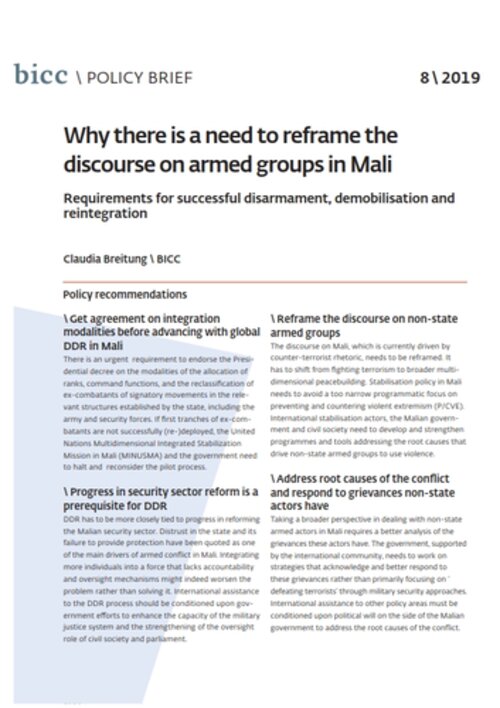Publications
Why there is a need to reframe the discourse on armed groups in Mali: Requirements for successful disarmament, demobilisation and reintegration
Release Date
2019-10
Language
- English
Topics
- –
In Policy Brief „Why there is a need to reframe the discourse on armed groups in Mali” the author Claudia Breitung addresses requirements for successful disarmament, demobilisation and reintegration in the country.
In particular, she gives the following policy recommendations:
\ Get agreement on integration modalities before advancing with global DDR in Mali
There is an urgent requirement to endorse the Presidential decree on the modalities of the allocation of ranks, command functions, and the reclassification of ex-combatants of signatory movements in the relevant structures established by the state, including the army and security forces. If first tranches of ex-combatants are not successfully (re-)deployed, the United Nations Multidimensional Integrated Stabilization Mission in Mali (MINUSMA) and the government need to halt and reconsider the pilot process.
\ Progress in security sector reform is a prerequisite for DDR
DDR has to be more closely tied to progress in reforming the Malian security sector. Distrust in the state and its failure to provide protection have been quoted as one of the main drivers of armed conflict in Mali. Integrating more individuals into a force that lacks accountability and oversight mechanisms might indeed worsen the problem rather than solving it. International assistance to the DDR process should be conditioned upon government efforts to enhance the capacity of the military justice system and the strengthening of the oversight role of civil society and parliament.
\ Reframe the discourse on non-state armed groups
The discourse on Mali, which is currently driven by counter-terrorist rhetoric, needs to be reframed. It has to shift from fighting terrorism to broader multi-dimensional peacebuilding. Stabilisation policy in Mali needs to avoid a too narrow programmatic focus on preventing and countering violent extremism (P/CVE). International stabilisation actors, the Malian government and civil society need to develop and strengthen programmes and tools addressing the root causes that drive non-state armed groups to use violence.
\ Address root causes of the conflict and respond to grievances non-state actors have
Taking a broader perspective in dealing with non-state armed actors in Mali requires a better analysis of the grievances these actors have. The government, supported by the international community, needs to work on strategies that acknowledge and better respond to these grievances rather than primarily focusing on ‘defeating terrorists’ through military security approaches. International assistance to other policy areas must be conditioned upon political will on the side of the Malian government to address the root causes of the conflict.
PDF-Download
BICC_Policy_Brief_8_2019.pdf
[English] (224.13 KB)

Cite as
@techreport{Breitung2019,
author = "Claudia Breitung",
title = "Why there is a need to reframe the discourse on armed groups in Mali: Requirements for successful disarmament, demobilisation and reintegration",
latexTitle = "Why there is a need to reframe the discourse on armed groups in Mali: Requirements for successful disarmament, demobilisation and reintegration",
publisher = "BICC",
number = "8",
institution = "BICC",
type = "BICC Policy brief",
year = "2019",
address = "Bonn",
}
Document-Type
BICC Policy brief
Publisher
BICC
Place
Bonn
Countries/Region
Mali



